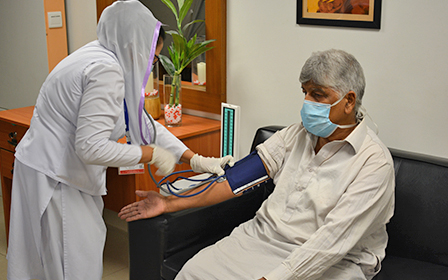Home Care Services: Beyond the Basics

As the aging population grows, so does the demand for comprehensive home care services. These services extend far beyond basic assistance with daily activities, providing an essential lifeline for many seniors who wish to maintain their independence and quality of life while aging in place. This article explores the various facets of home care services, highlighting the advanced and specialized offerings that go beyond the basics to meet the diverse needs of seniors.
The Evolution of Home Care Services
Traditionally, home care services were primarily focused on providing help with activities of daily living (ADLs) such as bathing, dressing, eating, and mobility. While these fundamental services remain crucial, the scope of home care has significantly expanded. Today’s home care providers offer a wide range of specialized services designed to address the complex health, emotional, and social needs of seniors.
Comprehensive Health Management
Modern home care services often include comprehensive health management, which can involve skilled nursing care, medication management, and chronic disease management. Skilled nursing care is provided by registered nurses who can perform medical procedures, monitor health conditions, and administer medications. This level of care is particularly beneficial for seniors with chronic conditions such as diabetes, heart disease, or respiratory issues, ensuring that they receive the necessary medical attention without leaving their homes.
Medication Management
Medication management is another critical component of advanced home care services. Seniors often take multiple medications, which can lead to confusion and potential medication errors. Home care providers can help manage prescriptions, organize medications, and provide reminders to ensure proper adherence. This service not only improves health outcomes but also reduces the risk of hospital readmissions due to medication-related issues.
Chronic Disease Management
Chronic disease management involves creating personalized care plans tailored to the specific needs of seniors with long-term health conditions. Home care providers work closely with healthcare professionals to monitor symptoms, adjust treatments, and provide education on disease management. This proactive approach helps seniors manage their conditions more effectively and maintain a higher quality of life.
Rehabilitation and Therapy
Rehabilitation and therapy services are integral to helping seniors recover from illnesses, injuries, or surgeries. These services can include physical therapy, occupational therapy, and speech therapy, all of which are designed to restore functionality and independence.
Physical Therapy Services
Physical therapy focuses on improving strength, mobility, and balance, which are crucial for preventing falls and maintaining overall physical health. Physical therapists create customized exercise programs that can be performed at home, making it easier for seniors to stay active and engaged in their recovery.
Occupational Therapy
Occupational therapy helps seniors regain the ability to perform daily tasks and activities. Therapists work with seniors to develop strategies and modifications that make everyday activities more manageable, such as using adaptive equipment or simplifying routines. This type of therapy is especially valuable for seniors with arthritis, stroke, or other conditions that affect their ability to perform ADLs.
Specialized Alzheimer’s and Dementia Care
Caring for seniors with Alzheimer’s disease or other forms of dementia requires specialized knowledge and skills. Home care providers offer tailored services to meet the unique needs of these individuals, focusing on promoting safety, comfort, and cognitive stimulation.
Cognitive Stimulation
Cognitive stimulation activities are designed to engage seniors with dementia in meaningful and mentally stimulating tasks. These activities can include puzzles, memory games, music therapy, and reminiscence therapy. Engaging in these activities can help slow cognitive decline, improve mood, and enhance the overall well-being of seniors with dementia.
Behavioral Support
Seniors with dementia may exhibit challenging behaviors such as aggression, agitation, or wandering. Home care providers trained in dementia care can implement behavior management techniques to reduce these behaviors and create a calm, supportive environment. This specialized care helps alleviate stress for both the seniors and their family members.
Safety and Supervision
Ensuring the safety of seniors with dementia is paramount. Home care providers can make home modifications to reduce hazards, provide supervision to prevent wandering, and implement safety protocols to protect seniors from harm. This level of care provides peace of mind for families, knowing their loved ones are in a secure and supportive environment.
Palliative and End-of-Life Care
Palliative and end-of-life care services are designed to provide comfort, support, and dignity to seniors with serious illnesses or those nearing the end of life. These services focus on managing symptoms, alleviating pain, and addressing emotional and spiritual needs.
Symptom Management
Home care providers offer symptom management for seniors with serious illnesses, including pain relief, nausea control, and respiratory support. This care aims to improve the quality of life by ensuring seniors are comfortable and their symptoms are well-managed.
Emotional and Spiritual Support
Emotional and spiritual support is a crucial aspect of palliative and end-of-life care. Home care providers offer counseling, companionship, and spiritual guidance to seniors and their families, helping them navigate the emotional challenges associated with serious illness or end-of-life transitions. This support can provide solace, reduce anxiety, and foster a sense of peace during difficult times.
Respite Care
Respite care services give family caregivers a much-needed break, allowing them to rest and recharge while ensuring their loved ones receive professional care. This temporary relief can be invaluable for preventing caregiver burnout and maintaining the well-being of both the caregivers and the seniors they care for.
Social and Recreational Activities
Maintaining social connections and engaging in recreational activities are essential for seniors’ mental and emotional well-being. Home care providers often organize and facilitate social and recreational activities that promote interaction, creativity, and joy.
Social Engagement
Social engagement activities can include group outings, community events, or virtual gatherings that allow seniors to connect with others and build meaningful relationships. Regular social interaction helps combat loneliness and isolation, which are common issues among seniors living alone.
Recreational Activities
Recreational activities, such as arts and crafts, gardening, music, and games, provide seniors with opportunities to pursue hobbies, express creativity, and have fun. These activities contribute to a sense of purpose and fulfillment, enhancing overall quality of life.
Technology Integration
The integration of technology in home care services has opened up new possibilities for enhancing care delivery and improving seniors’ independence.
Telehealth Services
Telehealth services allow seniors to access medical consultations, follow-up appointments, and health monitoring from the comfort of their homes. This technology reduces the need for in-person visits, making healthcare more convenient and accessible.
Remote Monitoring
Remote monitoring devices, such as wearable sensors and smart home systems, enable real-time tracking of seniors’ health and safety. These devices can alert caregivers to potential issues, such as falls or changes in vital signs, allowing for timely intervention and support.
Assistive Technologies
Assistive technologies, including voice-activated assistants, medication dispensers, and mobility aids, empower seniors to manage their daily tasks more independently. These technologies enhance safety, convenience, and quality of life for seniors living at home.
Conclusion
Home care services have evolved significantly, offering a wide range of specialized and advanced care options that go beyond basic assistance with daily activities. From comprehensive health management and rehabilitation services to specialized dementia care and palliative support, modern home care providers are equipped to meet the diverse and complex needs of seniors. By embracing these advanced services, seniors can enjoy a higher quality of life, maintain their independence, sky heart home care, and age in place with dignity and comfort. As the demand for home care services continues to grow, it is essential for providers to stay innovative and responsive to the evolving needs of the aging population.



